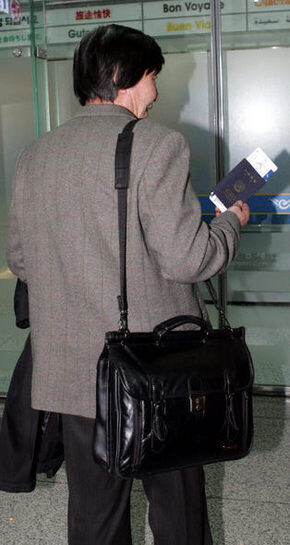hankyoreh
Links to other country sites 다른 나라 사이트 링크
Repatriated independence fighters and their offspring face hardship

Choi Young-gyu, 59, is the grandson of Han Young-bal, who was jailed during the Japanese colonial period for participating in the March 1 independence movement. Last year, Choi settled down in South Korea with his five family members, one-and-a-half years after beginning a struggle to leave China and return to the country where his grandfather fought so valiantly for freedom.
Choi suffers from diabetes, and his wife, Nam Bong-rae, 56, cannot work due to back pain. His 34-year-old son returns home late at night after working at a construction site, while his daughter-in-law puts in long hours at a restaurant. In spite of such hard work, however, they rarely are free from the yoke of poverty.
Though their ancestors fought for the nation’s independence during the 1910-45 Japanese colonial rule, offspring of independence activists moving back to Korea from abroad often face a harsh reality trying to survive rather than a warm welcome from South Koreans.
Last July, the South Korean government held an event at which 33 offspring of indepedence fighters were naturalized, in order to publicise the government’s efforts made on behalf of the offspring of independence fighters. The 33 people in 18 households that came to South Korea after spending their lives in China and other central Asian countries - scattered since the colonial period and World War II - suddenly found themselves in a special media spotlight.
But, seven months later, the lights of the media’s cameras have faded, and of the 18 households who returned, many live a miserable existence here, struggling to eke out a living as the government’s promise for financial support has failed to translate into action. The government is currently witholding its provision of "settlement subsides" from all 33 people, saying that more investigation is needed to confirm that they are the genuine offspring of patriots.
Among 18 households who returned to South Korea, 15 reportedly qualify for the subsidies, as they are confirmed to be direct offspring, within three generations, of independence heroes. Still, based on the experience of other repatriated independence fighters and their offspring, the 15 households will have to wait more than a year from the time they first filed their paperwork to receive the financial support because of the miles of red tape involved.
The one-time settlement subsidy for independence fighters themselves would total 70 million won (US$74,000) and between 45-70 million won for the households of the fighters’ offspring, depending on the number of family members.
Due to prolonged economic difficulties, some of the 33 have returned to China. Twenty-seven of the 33 that agreed to be interviewed by the Hankyoreh, or 16 out of 18 households, all said they are living hand-to-mouth, performing manual labor. Ten people said they had not worked in the last 10 days, and 10 others said they do not have a stable job. Of the 16 households that agreed to be interviewed, half were living in poverty, their monthly budgets at less than 1,314,000 won per three-person household, or a figure 40 percent of that of the average urban household budget.
In response to the situation, the Ministry of Patriots & Veterans’ Affairs promised that it would improve the administrative process to provide state support for such families. "We feel sorry that we could not help the offspring settle down here in an expeditious way," a ministry official said. "We will streamline the process in order to provide the subsidies within one or two weeks."
Please direct questions or comments to [englishhani@hani.co.kr]
Editorial・opinion
![[Column] Park Geun-hye déjà vu in Yoon Suk-yeol [Column] Park Geun-hye déjà vu in Yoon Suk-yeol](https://flexible.img.hani.co.kr/flexible/normal/500/300/imgdb/original/2024/0424/651713945113788.jpg) [Column] Park Geun-hye déjà vu in Yoon Suk-yeol
[Column] Park Geun-hye déjà vu in Yoon Suk-yeol![[Editorial] New weight of N. Korea’s nuclear threats makes dialogue all the more urgent [Editorial] New weight of N. Korea’s nuclear threats makes dialogue all the more urgent](https://flexible.img.hani.co.kr/flexible/normal/500/300/imgdb/original/2024/0424/7317139454662664.jpg) [Editorial] New weight of N. Korea’s nuclear threats makes dialogue all the more urgent
[Editorial] New weight of N. Korea’s nuclear threats makes dialogue all the more urgent- [Guest essay] The real reason Korea’s new right wants to dub Rhee a founding father
- [Column] ‘Choson’: Is it time we start referring to N. Korea in its own terms?
- [Editorial] Japan’s rewriting of history with Korea has gone too far
- [Column] The president’s questionable capacity for dialogue
- [Column] Are chaebol firms just pizza pies for families to divvy up as they please?
- [Column] Has Korea, too, crossed the Rubicon on China?
- [Correspondent’s column] In Japan’s alliance with US, echoes of its past alliances with UK
- [Editorial] Does Yoon think the Korean public is wrong?
Most viewed articles
- 1[Column] Park Geun-hye déjà vu in Yoon Suk-yeol
- 2Will NewJeans end up collateral damage in internal feud at K-pop juggernaut Hybe?
- 3N. Korean hackers breached 10 defense contractors in South for months, police say
- 4[Editorial] New weight of N. Korea’s nuclear threats makes dialogue all the more urgent
- 5[Cine feature] A new shift in the Korean film investment and distribution market
- 6Up-and-coming Indonesian group StarBe spills what it learned during K-pop training in Seoul
- 7[Column] The clock is ticking for Korea’s first lady
- 8Terry Anderson, AP reporter who informed world of massacre in Gwangju, dies at 76
- 9Thursday to mark start of resignations by senior doctors amid standoff with government
- 10Kim Jong-un expressed ‘satisfaction’ with nuclear counterstrike drill directed at South